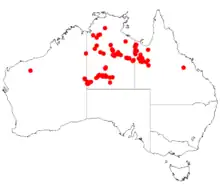| Chippendale's wattle | |
|---|---|
| Scientific classification | |
| Kingdom: | Plantae |
| Clade: | Tracheophytes |
| Clade: | Angiosperms |
| Clade: | Eudicots |
| Clade: | Rosids |
| Order: | Fabales |
| Family: | Fabaceae |
| Subfamily: | Caesalpinioideae |
| Clade: | Mimosoid clade |
| Genus: | Acacia |
| Species: | A. chippendalei |
| Binomial name | |
| Acacia chippendalei | |
 | |
| Occurrence data from AVH | |
Acacia chippendalei, commonly known as Chippendale's wattle, is a shrub belonging to the genus Acacia and the subgenus Lycopodiifoliae endemic to northern Australia.
Description
The sprawling spreading shrub typically grows to a height of 0.2 to 0.5 metres (1 to 2 ft).[1] The stems are covered in fine velvety, erect, spreading white hairs and stipules with a length of 0.4 to 1 mm (0.016 to 0.039 in). The green phyllodes occur in whorls of 8 to 11 and are slightly flattened or straight with a length of 2.5 to 8 mm (0.098 to 0.315 in) and have an obscure adaxial nerve.[2] It blooms from September to October and produces yellow flowers.[1]
Taxonomy
The species was first formally described by the botanist Leslie Pedley in 1972 as part of the work A revision of Acacia lycopodiifolia A. Cunn. ex Hook. and its Allies as published in the Contributions from the Queensland Herbarium. It was reclassified as Racosperma chippendalei by Pedley in 1987 then transferred back to genus Acacia in 2001.[3]
Distribution
It is native to an area in Queensland, the Northern Territory and the Kimberley and Goldfields regions of Western Australia.[1] It is found from the Sir Frederick Range in Western Australia in the west through central parts of the Northern Territory to around Cloncurry to Mount Isa where it grows in skeletal rocky lateritic and deep sandy soils.[2]
See also
References
- 1 2 3 "Acacia chippendalei". FloraBase. Western Australian Government Department of Biodiversity, Conservation and Attractions.
- 1 2 "Acacia chippendalei". World Wide Wattle. Western Australian Herbarium. Retrieved 26 July 2019.
- ↑ "Acacia chippendalei Pedley Chippendale's Wattle". Atlas of Living Australia. Global Biodiversity Information Facility. 25 July 2019.